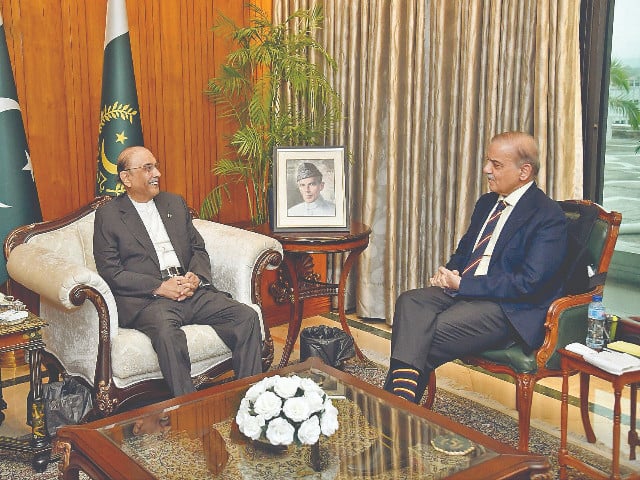ISLAMABAD: President Asif Ali Zardari on Saturday gave firm support to armed forces following what Islamabad has described as “unprovoked missile attacks” by India, as tensions between the nuclear-armed neighbours flare dangerously.
Furthermore, Prime Minister Muhammad Shehbaz Sharif met the President at Aiwan-e-Sadr to brief him on the country’s immediate and ongoing response to the aggression, which is being carried out under Operation Bunyan-un-Marsoos.
The meeting was also attended by Deputy Prime Minister and Foreign Minister Senator Ishaq Dar, and Minister for Law and Justice Senator Azam Nazeer Tarar.
In this regard, President Zardari lauded the military for its “exceptional professionalism and bravery” in executing what he called a “befitting response” to Indian hostility.
صدر مملکت آصف علی زرداری سے وزیراعظم محمد شہباز شریف کی ایوان صدر میں ملاقات
وزیر اعظم نے صدر مملکت کو بھارتی جارحیت اور پاکستان کی جانب سے آپریشن “بنیان مرصوص” کی صورت میں بھارت کو دیئے جانے والے موثر جواب کے بارے آگاہ کیا
ملاقات کے دوران نائب وزیراعظم/وزیر خارجہ سینیٹر محمد… pic.twitter.com/lMe3Rk53Uq
— Pakistan Peoples Party Digital (@pppdigitalpk_) May 10, 2025
In addition, the meeting also stressed that Pakistan has long pursued peace, he said the country was left with no choice but to respond in defence of its sovereignty and citizens.
“Pakistan has shown considerable restraint, but India’s continued belligerence has left us with no option but to respond decisively,” Zardari said.
Pakistan launched its Al-Fatah missile, named in memory of the children killed in cross-border attacks earlier this week.
Moreover, India has yet to issue an official statement in response to Pakistan’s claims or the military operation.
Also Read: Khawaja Asif rejects NCA meeting reports amid escalating tensions with India
However, Indian Air Force Wing Commander Vyomika Singh, speaking at a press conference in New Delhi alongside Indian Army’s Colonel Sophia Qureshi and Foreign Secretary Vikram Misri, said India remains committed to de-escalation, but only if Pakistan reciprocates.
In such a scenario, diplomatic channels remain quiet, the region watches anxiously as both countries stand at a precarious juncture.





